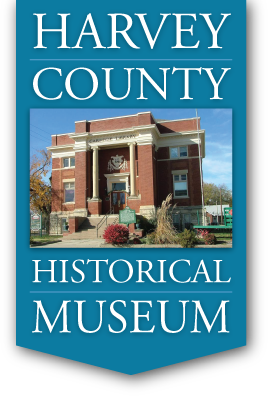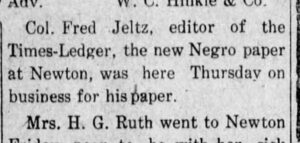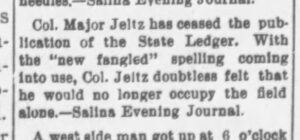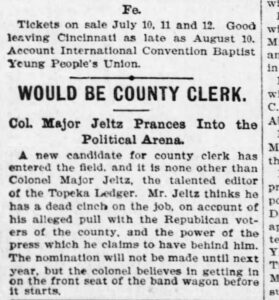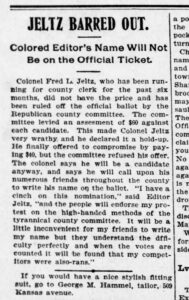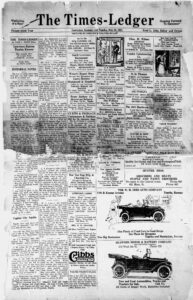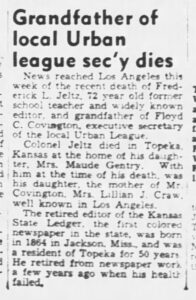by Kristine Schmucker, Archivist/Curator
One area that has not received much attention is that of black owned newspapers in Kansas. In March 1878, the first black owned and operated newspaper in Kansas, The Colored Citizen, began printing in Fort Scott, Ks. Topics included a mix of political and community news. Challenges included financing and reaching their audience. Most black newspaper editors in the 1890s had to supplement their income by doing printing jobs for other entities. Several were clergy, lawyers and business clerks.
Only one man lists his occupation as editor or journalist in the city directories and census’, Fredrick L. Jeltz. Jeltz also had connections to Newton, Ks.
Jeltz was born in Jackson. Mississippi in June 1865 and was educated at Tougaloo University, Jackson, MI, and graduated in 1877. He spent some time as a teacher before undertaking his life’s work as a journalist and newspaper man. By 1881, he was living in Topeka, Kansas, where he worked with another black newspaper editor, William M. Pope. He started his own Topeka newspaper in July 1892, the Kansas State Ledger.
In order to increase his audience and get more subscription, Jeltz, like many other editors, would take promotional trips. These trips helped him keep in touch with communities all over Kansas and even the “Territories.” On one such trip, Jeltz returned with more than one hundred new subscribers. (Kansas State Ledger 14 April 1893) He also was an orator at political events. (**See news clipping from the Topeka Daily Press below.)
F.L. Jeltz Editor
Kansas State Ledger
From the start Jeltz approached his business differently. In 1893, he was criticized for hiring black and white, male and female employees. The fact that he had white employees seemed especially upsetting. Jeltz responded to the critics:
“We draw no color line. It will not do; it tends to excite controversies between two races. We employ white help at the office as well as colored. In fact, we divide up the employment. We draw no color line.” (Kansas State Ledger 20 January 1893, p.2.)
In 1895, Jeltz was interviewed by the Kansas Farmer & Mail & Breeze. The editor described Jeltz as “one of the most noted colored editors in the state” and praised his “quick perception . . elegant and explicit manner in which he expresses himself.”
In the interview, Jeltz observed that the “present administration has done but little towards my race” and he did not expect a unified black vote in the next election, unlike the previous election. His advice for the 1894 election? “Competent and experienced men should be selected at an early date” with a clear message to cut down on confusion.
Jeltz saw his publication as a way to encourage black voters and a place to speak out about issues that mattered to their communities. In 1895, he spoke out about lynching. In one instance, Jeltz even questioned the motives of the of white woman who accused the black man who was later lynched. He went on to state that those that had a hand in the lynching “are worse than inhuman curs . . . every negro newspaper in the state of Kansas should . . . sound the battle cry of justice.” Jeltz also called out the influence of the “white caps and a cowardly sheriff” in a lynching situation in Saline. Jeltz wrote about lynching:
“Lynch law seems to be a germ terminating in an epidemic. It begins in the feet and at least monopolizes the whole body. Let us say, call out the militia and shoot the lynchers.”
Newton News-Ledger
He stopped publishing the Kansas State Ledger in August 1906 and may have lived in Newton for a time. In March 1908, he launched American Times. In 1914, he reportedly purchased two newspapers in Wichita and created the Times-Ledger which he published in connection to the Newton News-Ledger.
It is not known how long he published or even if he actually published a Newton paper. No copies exist and the Newton Kansan for 2 April 1914, gives the impression that plans may have fallen through. ****
“Newton is to have a new newspaper. This is not one of the rumors that have been going around, but a real news item. It is not a story about Col. Major Jeltz’s effort, not is it a tale of the final consummation of some schemes for a new daily paper.”
The Wichita papers were published somewhat regularly until 1917.
He gained statewide recognition with his “Jolts from Jelts” which appeared in many local newspapers.
Deadly Assault on the English Language & Other Problems
Unfortunately F.L. Jeltz often found himself in legal difficulties and at odds with other white editors.
For a brief time in 1904, Jeltz moved to Kansas City with his paper. The surrounding newspaper editors had scathing reviews of Jeltz’s work. The Neodesha Register, December 16, 1904, noted that “he is the only Topeka man who ever ran a paper with a crowbar . . . . wrote entirely by ear . . . and when he wasn’t making deadly assault on the English language, he was explaining things in police court.” Editors around the state frequently point out his “new fangled spelling” and other misdeeds.
“Superb Gall”
Running a newspaper was difficult. Finding sponsors and advertisers, selling subscriptions all took time and energy. In 1892, Jeltz bragged that the Kansas State Ledger received financial assistance from railroad companies and the paper “has become one of the leading organs of the state of Kansas – 2,000 readers.” (Kansas State Ledger, 18 November 1892, p. 4.) Jeltz had other less popular ways of funding his paper.
In 1902 Jeltz’s paper was suspended by I.P. Gardner who held a mortgage. At the same time, the Kansas City Star decided it would no longer print Jeltz’s column “Joltz from Jeltz.” (Kansas Semi Weekly Capital, 14 May 1902) Disappointed, Jeltz, not willing to give up, continued to look for ways to fund his paper.
In October 1902, the Ottawa Weekly Republic reported that “County Officials Refuse to be Held up by Colored Editor.” Jeltz, sometimes referred to as “Colonel Major Jeltz,” had come to Ottawa with his “itching palm and the heavy weight aphoristic editorials, who has held up more office seekers than any railroad dared by virtue of threats.”
The article goes on to describe Jeltz with his “broad expansive smile . . . illuminating the atmosphere, his glad hand was extended, his seductive tongue was working overtime and in short, his whole scheme of gentle persuasive hold up was in motion . . . The colonel is hard to resist.” Jeltz would ask for money and in return he promised the influence of his paper to help their campaigns. The desired election outcome was not guaranteed , but Jeltz would be long gone. This time, in Ottawa, he met a stony reception and the county officials told him to go. The editor of the Ottawa Weekly Republican closed with these words:
“Colonel Jelts is to be admired for his superb gall. Colonel Jeltz is to be detested for being a human parasite. The office seeker who bears Col. Jeltz’s mark of approval displays the badge of his asininity.”
“Jeltz on the War Path” – 1901
Jeltz was also active politically, frequently using his paper to influence readers to vote for certain candidates. In 1900, he was the candidate when he ran for county clerk (Topeka Daily Capital, 5 July 1900).
Despite his best efforts, his name did not appear on the official ballot because he did not have the assessment each candidate had to pay – $60. He offered to pay $40, but the committee refused. Jeltz ran a write in campaign saying that “the people will endorse my protest . . . of the tyrannical county committee.” (Topeka Daily Capital 21 May 1901).
On June 4, 1901, the headline read “Jeltz on the Warpath.” Jeltz claimed he was the “victim of a dire conspiracy.” Jeltz claimed that 1) bankers conspired to reject his petition for a loan to enter the race; 2) liverymen would not allow Jeltz to use their wagons “unless he paid cash in advance;” 3) the election committee conspired to “count Mr. Jeltz out,” by ruthlessly throwing his votes aside.
“He has let Whiskey get the Better of Him”
In 1903, Jeltz was arrested for being drunk and insulting a white woman on the street. He spent the night in jail. The woman did not bring a complaint against him, but did note that “he has insulted her on former occasions.” This was not an isolated incident according to the article, however Jeltz maintained it was a case of mistaken identity.
Jeltz was again in trouble with the law after he assaulted a “colored woman.” The editor of the Lawrence Daily World concluded that “he has let whiskey get the better of him.” More altercations followed in the next few years.
In March 1909, Mrs. Jeltz alleged that her husband became “insane and dangerous when under the effect of liquor . . . he is no longer a safe companion.” (Topeka State Journal 18 March 1909)
In the trial that followed Mrs. Jeltz testified that he fought with family and “would draw a knife and fight the stove pipe.” Jeltz testified on his own behalf explained that “these outbursts . . . were merely pastimes and that he would not harm anyone.” He was found insane due to heavy drink and nervous breakdown due to old age (Jeltz was 44 at the time). Although he was supposed to go to the insane asylum, there was no room at the state hospital. The Iola Daily Index reported that the decision of the court that he was crazy did not “hinder the veteran colored editor and politician from issuing his newspaper.”
In 1915, Jeltz is again in the news for “obtaining money on false pretenses” in Cherokee County. He was soliciting subscriptions and advertising for his newspaper, which people paid in advance. It was discovered that “he is not the editor of any paper and cannot full his contract. . . he has worked a number of towns in the same manner.” (Cherokee Sentinel 17 September 1915)
Jeltz continued publishing until at least May 1921.
Fredrick L. Jeltz died in Topeka, March 1937 at the age of 72 and is buried at Mt Auburn Cemetery in Topeka, Ks.
Notes
****The new paper they are referring to is the “Democrat” with Mack Cretcher and B.W. Harlow as editors.
**The Topeka Daily Press printed a speech he gave January 10, 1896.
Jeltz Brothers
F.L. Jeltz had a brother William who also ran a newspaper, the People’s Friend. William also experienced difficulty with law enforcement.
“There are two Jeltz’s in the newspaper business, Colonel Jeltz, who writes the lucid paragraphs for the Ledger is a republican: Colonel William or Bill Jeltz runs a populist paper or did until he was cast into the Rice county bastille. . . Bill has not the clear and luminous style of writing of his brother. (Pratt County Republican, 9 December 1897)
Sources
- Atchison Weekly Globe 25 March 1909.
- Colony Free Press: 5 May 1904.
- Humbolt Herald 5 November 1909.
- Halstead Independent: 7 May 1914.
- Iola Daily Index, 17 April 1909.
- Lawrence Daily World 28 November 1904.
- Leavenworth Weekly Times: 1 December 1904.
- National Field: 30 June 1899.
- Newton Kansan: 13 September 1884, 15 September 1898, 21 July 1899, 29 September 1899 25 June 1906, 2 April 1914, 10 June 1915.
- Sedgwick Pantagraph: 9 April 1914.
- Topeka State Journal: 25 February 1896,10 February 1903, 26 April 1904, 18 March 1909, 19 March 1909.
- Topeka Daily Capital 10 February 1903, 19 March 1909.
- Topeka Daily Herald: 2 December 1904, 17 December 1904, 21 August 1906.
- Topeka Plaindealer: 17 July 1903.
- Times Ledger: 24 April 1920,3 July 1920, 28 May 1921.
Other Sources
- Jeltz, F.L. Obituary, clipping, n.d. Find a Grave Added: Apr 24, 2011, Find a Grave Memorial ID: #6887203.
- Eberle, Mark E. “William Lewis Eagleson and the Origins of African American Newspapers in Kansas” (2022) Monographs. 31. https//scholars.fhsu.edu/all_monographs/31.
- Ratzlaff, Aleen J. “Black Press Pioneers In Kansas: Connecting and Extending Communities in Three Geographic Sections, 1878-1900” Dissertation. University of Florida, 2001.
